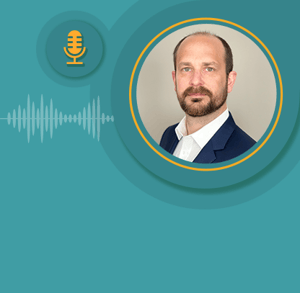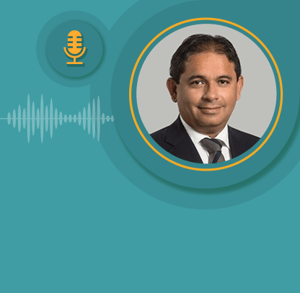In this podcast series, we undertake interviews with global professionals to discuss different aspects of litigation and litigation funding.
Deminor Litigation Funding welcomes you to join this conversation as we summarise the key elements of the conversations between the Deminor team and these experts, as captured in the podcast transcripts below.
Podcast Preface
Oliver Radway (OR), Senior Enforcement Associate at Deminor, speaks with Septimus Knox (SK), Director and Deputy Head of Disputes at S-RM.
In this interview, Oliver and Septimus discuss the complexities of litigation funding for disputes involving sovereign states, including challenges in enforcing awards and the rise of investor-state claims due to environmental policy changes. They also touch on how the investigative landscape is changing as a result of artificial intelligence.
Podcast Transcript
OR - I’m delighted to be joined by Septimus Knox of SRM. He is a Director of the Firm and Deputy Head of Disputes there. Thank you very much for joining us, Septimus.
You do quite a lot of work in the sovereign dispute space, so it would be great to sound you out on a few things and learn a bit more about the practice at SRM and the trends you've seen in the sector.
What are the recent patterns you've been witnessing in the sovereign dispute space?
SK - We work on sovereign disputes, we work on routine commercial litigation, arbitration, all manner of different things. But in the past few years, we've definitely seen more in the sovereign space, and that can be working against states, it can be working for states, it can be working enforcing awards against state-owned entities. It's very broad.
I think the consensus is it's getting harder to enforce awards and judgments against sovereigns. In terms of trends, I can start with the obvious answer, and that is claims against Russia or claims against Russian SOEs arising from Russian acts of state, such as the full-scale invasion of Ukraine a couple of years ago.
Under this umbrella, there's a huge amount of different things. There are direct, conflict-related claims, expropriation claims, counter-sanctions claims, and then, of course, arbitration of contracts that were cancelled or otherwise terminated as a result of the invasion. Some of these were actually launched by Russia and its SOEs.
The other development that we're keeping a very close eye on is the rise of investor-state claims as a result of changes to environmental policy worldwide.
There are a couple of things there. Some states are trying to go net zero, and that means that they're phasing out things like coal, and cancelling concessions, which creates disputes.
In other parts of the world, particular minerals such as rare earth metals are becoming highly sought-after assets. Some countries in Latin America and sub-Saharan Africa are seeking to reassert their control over those assets, shall we say. An example of that would be in Mexico, and Mexico is lithium, to be specific. That obviously gives rise to a huge number of investor-state claims.
Finally, if I was to spot another trend, it would be related to the types of claims that we see. This is more of a legal point than an investigative point, but there are more and more arbitrations under free trade agreements and regional trade agreements rather than under bilateral investment treaties. For example, there was the first investor-state case filed against the EU itself about a year ago or sometime last year.
OR - That definitely matches the trends we've been seeing at Deminor. Certainly, we’ve seen requests coming from or focusing on Latin America and sub-Saharan Africa. In terms of helping your clients try and enforce awards against sovereigns and their assets, what are the obstacles that you typically come across when doing that research?
SK - I'll try and stay in my lane here as an investigator rather than veer into the legalistic, which I did at the end of my previous comment. But in terms of the obstacles when we're tracing assets and identifying potentially attachable assets, and at the end of the day as a funder you're looking for monetisation, there are two very obvious dynamics that are unique to sovereign investigations.
They are sovereign immunity and alter ego. On the sovereign immunity point, the burden of proof regarding the commercial use of a given asset can be high. For example, if you identify a high-value property, you need to make a strong case that it's being let out on commercial terms, and there's a commercial exemption there.
On the alter ego point, it varies. It's a high bar to clear, and it varies massively from jurisdiction to jurisdiction. We have to be cognisant of that. Another dynamic, and again it's a fairly obvious one, but it's worth pointing out. Many of the assets that we look for that belong to states are mobile, like vessels and planes. Obviously, when something moves, it's harder to find and ultimately harder to seize. Those are three fairly obvious points.
A fourth point is that states have unique tools available to them when they want to frustrate enforcement proceedings. States that have decided not to honour an arbitrary award have usually done it before. They've usually learned from previous enforcement efforts against them, and they've structured their assets accordingly, which makes our job harder.
For example, a recalcitrant state debtor might seek to extend diplomatic immunity to commercial properties. They can also use the full apparatus of the state to frustrate and stymie investigative efforts. By that I mean, if you look at the UKOS case, Russia made information about its assets abroad a state secret, which obviously makes intelligence gathering harder.
On a related point, a crucial arrow in any investigator's quiver is human intelligence. That's human information derived from people. Typically speaking, when a matter is commercial, there's less fear or concern when you're talking to people about it. But when a state is involved, especially states that are maybe not NATO-aligned, shall we say, or states that are particularly recalcitrant, that there is a high level of fear and concern among people on the ground, the people we need to get to and speak to. We have to be very cognisant of that. They're very afraid of retribution, of what might happen to them. Those are some of the obstacles that we come across.

OR - Just to shift the attention and focus away from sovereign disputes for a second, what's been your experience of working with funders, both on a personal level and more broadly? The requests that you typically receive, are they quite similar or does it depend on the funder?
SK - Generally speaking, and I'm not just saying this because I'm on a funder's podcast, I think the funding market and its rise has been a real boon for investigators. It's really helped bring the work that we do into the mainstream, and ultimately it has been a force for good.
We focus on the pot of gold, on the assets at the end of the legal proceedings, which is very aligned, in my mind, to what funders are looking for. Ultimately, you're looking for a positive return for your investors. Recoverability and actual assets are crucial to both our processes, and they're really at the core of it. It's about how you turn a legal judgement or a legal award into cash. In terms of how we work with funders, it's very broad. But again, I think funders being present in the market means that questions of whether to pursue a claim, how to pursue it, and importantly, how to do so in a cost-conscious manner, are much more common.
There's a very broad range of scenarios, but I'll touch on a few. We work with banks and funders to assess NPL portfolios. Sometimes, we're assisting on triaging these portfolios, sometimes we're helping a bank to find a funder. We're tracing assets in those scenarios. Sometimes, we’re helping a claimant achieve funding by preparing their claim for a funding decision. That's focusing on the recoverability side of things and making sure that the claim is viable from not just a legal perspective but from a financial perspective. Is there going to be a return at the end?
Another thing we see a lot when working with funders is being asked very specific questions. Recovery can hinge on a very specific piece of non-public information, such as who is the beneficiary of this asset which is held by an SPV or an offshore entity. That's something we come across a lot.
In very rare cases, we have actually worked with funders when an individual has reneged on their funding agreement, helping the funder recover funds, which is an interesting dynamic. But every funder has a different approach. They all have slightly different requirements. But I think at the heart of it, when we work with the funder, we're laser-focused on recoverability. It’s very high on the list of priorities.
I think the other thing that's crucial that we have to consider in all cases, is the question of proportionality. Are our efforts commensurate with the outcome that we're seeking to achieve? Because that can be very important. There's no point spending huge amounts of money when the return is not going to match those efforts.

OR - Finally, it would be remiss of me to conduct this podcast without any mention of AI, which has obviously been the buzzword of 2024, and I'm sure we're only at the beginning. How do you think the development of artificial intelligence is going to impact asset tracing investigations? Have you seen benefits in your work? Are our jobs safe?
SK - I think our jobs are safe for the time being, and I might answer your question in reverse. Have we already seen the benefits? Yes, I think we have. I can give you a couple of examples. Ten years ago, if you located a photo of an individual, everyone might crowd around a computer trying to compare it to another photo, saying ‘is this the same person?’ Nowadays, we use facial recognition software and we can find dozens or hundreds of photos of an individual online in an instant.
Another example would be machine translation, which again is a type of AI. You get a PDF in a language that no one speaks or that is very rare. You can translate it into English in a matter of seconds. That is again something that used to require a lot of effort or cost outlay for professional translation.
A further example of how AI has changed an investigator's job is enterprise search. All investigators in our world have collected huge amounts of data and information over time. These used to be held in complex file systems, whereas now, almost everyone has an AI-backed way of searching through all this information and bringing up pertinent information in seconds.
Those are just a handful of examples. On the flip side, there are the malignant actors of the world, the fraudsters, the hackers, whoever it might be, who can use AI to make our jobs a lot harder. They can create deep fakes, they can pump out kompromat, or false information on an industrial scale. They can use large language models to create convincing emails in a foreign language they don't speak and send them out. While AI has tooled us up, it's also tooled up our adversaries in some cases.
As you said, AI is the flavour of the month, but particularly generative AI such as Open AI's ChatGPT. The issue with a large language model is that it requires the transfer of data to a third party. That makes it a much wilder horse to control. There are lots of issues there relating to data privacy. For example, we handle our clients' most sensitive data. We're answering complex business-critical problems. I can't imagine they'd be very happy if they found out we were uploading that all into ChatGPT and Sam Altman and his friends were using it to train their next GPT-5 or whatever it might be.
We use it for certain things. You can summarise an article or translate an article in a large language model very easily, but it's not spitting out investigations, and it won't be anytime soon. So, are our jobs safe? Yes, I think they'll be safe for some time. I think what AI has done, and will continue to do, is change our methodology, but it's typically by augmenting it and making processes that used to be analogue more efficient, more effective, and easier.
Litigation Funding Podcast Series - Next Steps and Further Information:
Thanks for joining Deminor's Litigation Funding Podcast Series as we dive deep into core topics in funding litigation.
Keep a lookout for our upcoming conversations as the Deminor team speaks with several more experts to get their insights into different aspects of litigation funding.
If you would like to connect with either Oliver or Septimus on LinkedIn, please click on the links below:
Oliver Radway - Senior Enforcement Associate at Deminor
Septimus Knox - Director and Deputy Head of Disputes at S-RM
***
Further Reading:
- https://www.deminor.com/en/case-studies/co-funder-proposes-sharing-of-litigation-funding-risk-to-leverage-deminors-in-house-due-diligence-capability
- https://www.deminor.com/en/case-studies/financing-assertion-of-patents-protecting-manufacturing-processes
- https://www.deminor.com/en/case-studies/telecoms-patent-assertion-multi-jurisdictional-campaigns
- https://www.deminor.com/en/case-studies/canadian-innovative-start-up-preparing-for-a-david-v-goliath-litigation-funding-battle
- https://www.deminor.com/en/case-studies/whats-the-risk-assessing-the-risk-of-counter-assertion-by-the-defendant-in-patent-litigation
- https://www.deminor.com/en/case-studies/overstepping-the-mark-litigation-funding-trade-mark-infringement
- https://www.deminor.com/en/case-studies/lights-camera-action-recovering-damages-for-infringement-of-rights-in-a-short-film
- https://www.deminor.com/en/case-studies/recovering-damages-for-stolen-software-through-litigation-funding
- https://www.deminor.com/en/case-studies/funding-in-the-pharma-sector-/-investing-in-a-case-where-litigation-is-already-ongoing







